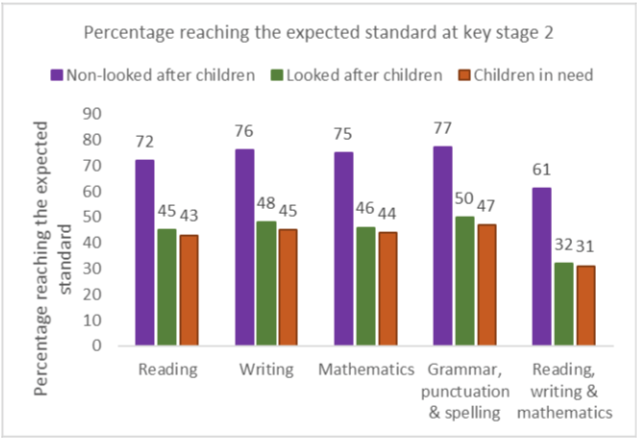 Local authority children's services departments and schools must increase their focus on educational outcomes of looked-after children, the government has said. An interim report of a government review on the issue concludes that poor educational outcomes for children in need are not inevitable, but agencies supporting them are not ambitious enough. "Our findings through the review so far, provide an assessment of why the educational outcomes of children in need are so poor, and what is needed to improve them," the report states. "Without delay, the leaders and practitioners who work with children in need - in schools, social care, early help, health, police, and beyond - can start to put these findings into practice. "This is not a change in direction, but an injection of aspiration; safety will always come first but is not an end goal." The report contains findings on how professionals who work with vulnerable children can better identify children in need, understand the impact of traumatic experiences, and what schools and children's services can do to help them achieve more educationally. The government plans to support professionals to do this by producing more evidence on what methods work when trying to improve educational outcomes for children in need. Part of this will come from an already announced pilot project being managed by the What Works Centre for Children's Social Care, involving the co-location of social workers in schools from spring 2019. It has also asked the Education Endowment Foundation (EEF) to analyse its existing evidence to assess the impact of interventions for children in need from the start of next year. The DfE said results from another EEF scheme - the Home Learning Environment trials in the North of England - should also be available from autumn 2019. And the government has committed to expanding its longitudinal dataset and analysing how child, family and school level factors make a difference to outcomes over time. DfE statistics show that attainment for looked-after children is much lower than for non-looked after children. However, it is slightly higher than the attainment of children in need. Education Secretary Damian Hinds said: "There is no reason why we should have a lower aspiration for a child in need of help or protection than we do for their peers.
"Whether it is making sure a child has a consistent and trusted member of staff or taking the time to speak to a child the morning after they have witnessed domestic abuse, I hope this practical advice can help those leaders in schools and social care, alongside our hardworking teachers and social workers, understand how we can collectively do to more to support these children." Sam Royston, director of policy and research at The Children's Society, said that while addressing the challenges children in need faced in education is important, the government also needed to help councils support young people's health, housing, employment and safeguarding needs, as well as consider extending key services to the age of 25. "Vulnerable young people who have had difficult childhoods need better help as they prepare for adult life and too often, the help they do get falls away when they turn 18 - even though their difficulties do not," said Royston. "It is crucial that the government also looks at what support children in need require beyond the school gates." The charity also wants the government to consider making the pupil premium available for all children in need. Plans to increase support for children in care featured in the Conservative Party manifesto for the June 2017 snap general election. The findings in the report were based on evidence submitted in March by more than 600 school and social care professionals. Source: www.cypnow.co.uk Comments are closed.
|
News & JobsNews stories and job vacancies from our member agencies, the fostering sector and the world of child protection and safeguarding as a whole. Browse Categories
All
|
|
The Fairer Fostering Partnership
c/o TACT Fostering Innovation House PO Box 137 Blyth NE24 9FJ |


 RSS Feed
RSS Feed
